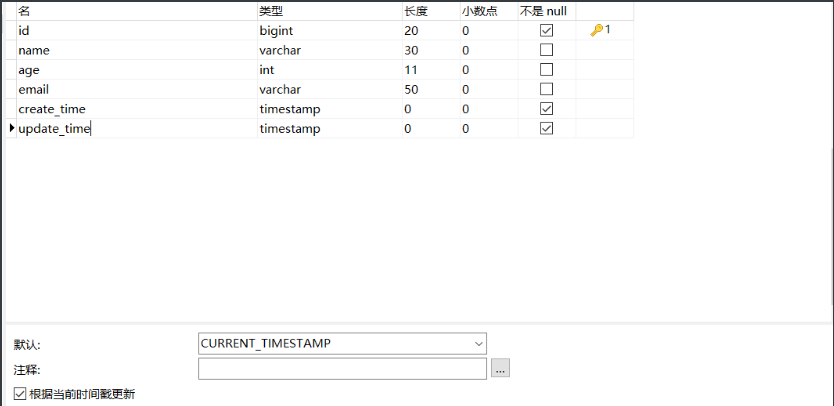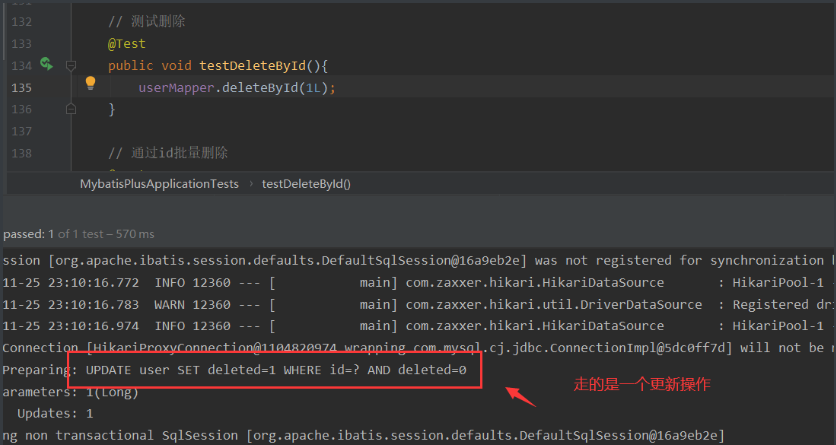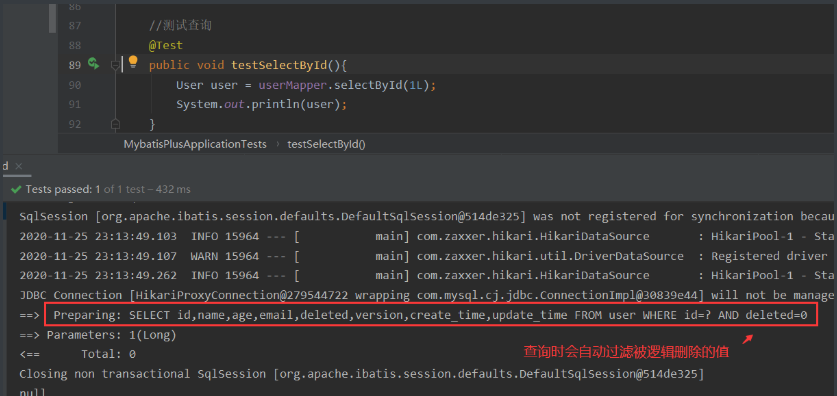Mybatis_plus
快速入门
使用第三方组件:
- 导入对应的依赖
- 研究依赖如何配置
- 代码如何编写
- 提高扩展技术能力!
步骤
1、创建数据库 mybatis-plus
2、创建user表
DROP TABLE IF EXISTS user;
CREATE TABLE user
(
id BIGINT(20) NOT NULL COMMENT '主键ID',
name VARCHAR(30) NULL DEFAULT NULL COMMENT '姓名',
age INT(11) NULL DEFAULT NULL COMMENT '年龄',
email VARCHAR(50) NULL DEFAULT NULL COMMENT '邮箱',
PRIMARY KEY (id)
);
DELETE FROM user;
INSERT INTO user (id, name, age, email) VALUES
(1, 'Jone', 18, 'test1@baomidou.com'),
(2, 'Jack', 20, 'test2@baomidou.com'),
(3, 'Tom', 28, 'test3@baomidou.com'),
(4, 'Sandy', 21, 'test4@baomidou.com'),
(5, 'Billie', 24, 'test5@baomidou.com');
-- 真实开发中, version(乐观锁)、deleted(逻辑删除)、gmt_create、gmt_modified
3、编写项目,初始化项目,使用Springboot初始化
4、导入依赖
<!-- 数据库驱动-->
<dependency>
<groupId>mysql</groupId>
<artifactId>mysql-connector-java</artifactId>
</dependency>
<!-- lombok-->
<dependency>
<groupId>org.projectlombok</groupId>
<artifactId>lombok</artifactId>
</dependency>
<!-- mybatis-plus-->
<!-- 自己开发的,并非官方的 -->
<dependency>
<groupId>com.baomidou</groupId>
<artifactId>mybatis-plus-boot-starter</artifactId>
<version>3.0.5</version>
</dependency>
使用mybatis-plus 可以节省我们大量的代码,尽量不要同时导入mybatis和mybatis-plus!版本差异
5、连接数据库!与mybatis相同
# mysql配置
spring.datasource.username=root
spring.datasource.password=123456
spring.datasource.driver-class-name=com.mysql.jdbc.Driver
spring.datasource.url=jdbc:mysql://localhost:3306/mybatis_plus?serverTimezone=Asia/Shanghai&useUnicode=true&zeroDateTimeBehavior=convertToNull&autoReconnect=true&characterEncoding=utf-8
6、使用了mybatis-plus 之后
- pojo
@Data
@AllArgsConstructor
@NoArgsConstructor
public class User {
private Long id;
private String name;
private Integer age;
private String email;
}
- mapper接口
//在对应的Mapper上面实现基本的接口 BaseMapper
@Repository //代表是持久层
public interface UserMapper extends BaseMapper<User> {
//所有的CRUD操作已经编写完成了
//不需要像以前一样配置大量的配置文件
}
注意:我们需要在主启动类上去扫描我们的mapper包下的所有接口@MapperScan("com.kuang.mapper")
- 测试
@SpringBootTest
class MybatisPlusApplicationTests {
//继承了BaseMapper,所有的方法都来自自己的父类
//我们也可以像往常一样编写自己的扩展方法
@Autowired
private UserMapper userMapper;
@Test
void contextLoads() {
//查询全部的用户
//参数是一个Wrapper,条件构造器,这里先不用设置为null
List<User> list = userMapper.selectList(null);
for (User user : list) {
System.out.println(user);
}
}
}
结果:

为什么通过短短几部就完成了?
1、SQL谁来完成的? -->mybatis-plus 完成的
2、方法哪里来的? -->mybatis-plus 完成的
配置日志
所有的sql现在是不可见的,我们希望知道它是如何执行的,所以我们必须看日志!
# 配置日志
mybatis-plus.configuration.log-impl=org.apache.ibatis.logging.stdout.StdOutImpl

日志配置完毕,后面的学习就需要注意这个自动生成的SQL
CRUD扩展
insert
//测试插入
@Test
public void testInsert(){
User user = new User();
user.setName("遇见狂神说");
user.setAge(12);
user.setEmail("9923014@qq.com");
int insert = userMapper.insert(user);
System.out.println(insert);
System.out.println(user);
}
数据库插入的id默认值为:全局唯一id
主键生成策略
插入操作
默认 ID_WORKER 全局唯一id
分布式系统唯一id生成:https://www.cnblogs.com/haoxinyue/p/5208136.html
雪花算法:
snowflake是Twitter开源的分布式ID生成算法,结果是一个long型的ID。其核心思想是:使用41bit作为毫秒数,10bit作为机器的ID(5个bit是数据中心,5个bit的机器ID),12bit作为毫秒内的流水号(意味着每个节点在每毫秒可以产生 4096 个 ID),最后还有一个符号位,永远是0。
主键自增
我们需要配置主键自增:
1、实体类字段上@TableId(type = IdType.AUTO)
2、数据库字段一定要自增!

3、再次测试插入即可!
其他源码解释
public enum IdType {
AUTO(0), //数据库id自增
NONE(1), // 未设置主键
INPUT(2), // 手动输入
ID_WORKER(3), //默认的全局id
UUID(4), //全局唯一id
ID_WORKER_STR(5); //ID_WORKER 的字符串表示法
private int key;
private IdType(int key) {
this.key = key;
}
public int getKey() {
return this.key;
}
}
更新操作
//测试更新
@Test
public void testUpdate(){
User user = new User();
//通过条件自动拼接动态sql
user.setId(6L);
user.setName("遇见chenfangy");
user.setAge(18);
// 注意:updateById 需要传入的参数是一个对象!
int i = userMapper.updateById(user);
System.out.println(i);
}

所有的sql都是自动帮你动态配置的!
自动填充
创建时间、修改时间!这些个操作都是一般都是自动化完成的,我们不希望手动更新!
阿里巴巴开发手册:所有的数据库表:gmt_create、gmt_modified、几乎所有的表都要配置上!而且需要自动化!
方式一:数据库级别(不建议这样使用)
1、在表中新增字段 create_time,update_time

2、再次测试插入方法,我们需要先把实体类同步!
private Date createTime;
private Date updateTime;
3、再次更新查看结果即可

方式二:代码级别
1、删除数据库的默认值、更新操作!(没有设置自动更新)
2、实体类字段属性需要增加注解
@Data
@AllArgsConstructor
@NoArgsConstructor
public class User {
//对应数据库中的主键(uuid、自增id、雪花算法、redis、zookeeper)
@TableId(type = IdType.INPUT) //IdType.INPUT一旦手动输入id后,就需要自己配置id了
private Long id;
private String name;
private Integer age;
private String email;
//字段添加填充内容
@TableField(fill = FieldFill.INSERT)
private Date createTime;
@TableField(fill = FieldFill.INSERT_UPDATE)
private Date updateTime;
}
3、编写处理器来处理这个注解
@Slf4j //日志
@Component //一定不要忘记把处理器加到IOC容器中!
public class MyMetaObjectHandler implements MetaObjectHandler {
//插入时的填充策略
@Override
public void insertFill(MetaObject metaObject) {
log.info("start insert fill.....");
//MetaObjectHandler setFieldValByName(String fieldName, Object fieldVal, MetaObject metaObject)
this.setFieldValByName("createTime",new Date(),metaObject);
this.setFieldValByName("updateTime",new Date(),metaObject);
}
//更新时的填充策略
@Override
public void updateFill(MetaObject metaObject) {
log.info("start update fill.....");
this.setFieldValByName("updateTime",new Date(),metaObject);
}
}
4、测试插入
5、测试更新、观察时间即可
乐观锁
乐观锁:顾名思义十分乐观,它总是认为不会出现问题,无论干什么都不去上锁!如果出现了问题,再次更新值测试
悲观锁:顾名思义十分悲观,它总是认为总是出现问题,无论干什么都会上锁!再去操作!
当要更新一条记录的时候,希望这条记录没有被别人更新
乐观锁实现方式:
- 取出记录时,获取当前version
- 更新时,带上这个version
- 执行更新时, set version = newVersion where version = oldVersion
- 如果version不对,就更新失败
乐观锁:1、先查询,获得版本号 version = 1
-- A
update user set name = "kuangshen",version = version + 1
-- B 线程抢先完成,这个时候 version = 2 , 会导致 A 修改失败!
update user set name = "kuangshen",version = version + 1
where id = 2 and version = 1
测试一下MP的乐观锁插件
1、给数据中增加version字段!

2、我们实体类加对应的字段
@Version
/**
* @Version 乐观锁注解
*/
private Integer version;
3、注册组件
/**
* @author chenfangy
* @Configuration 被这个注解标注说明是个配置类
* @MapperScan 扫描我们的mapper文件
*/
@MapperScan("com.kuang.mapper")
@EnableTransactionManagement
@Configuration
public class MyBatisPlusConfig {
/**
*
* 注册乐观锁插件
*/
@Bean
public MybatisPlusInterceptor MybatisPlusInterceptor() {
MybatisPlusInterceptor mybatisPlusInterceptor = new MybatisPlusInterceptor();
mybatisPlusInterceptor.addInnerInterceptor(new OptimisticLockerInnerInterceptor());
return mybatisPlusInterceptor;
}
}
4、测试一下
//测试乐观锁成功案例
@Test
public void testMybatisPlusLock(){
//1、查询用户的信息
User user = userMapper.selectById(1L);
//2、修改用户的信息
user.setName("小南风");
user.setAge(18);
//3、执行更新操作
userMapper.updateById(user);
}
//测试乐观锁失败案例 多线程下
@Test
public void testMybatisPlusLock2(){
//线程1
User user = userMapper.selectById(1L);
user.setName("小南风");
user.setAge(18);
// 模拟另外一个线程执行了插队操作
User user2 = userMapper.selectById(1L);
user2.setName("小南风222");
user2.setAge(11);
//3、执行更新操作
userMapper.updateById(user2);
// 自旋锁来多次尝试提交!
userMapper.updateById(user); //如果没有乐观锁就会覆盖插队线程的值!
}
查询操作
//测试查询
@Test
public void testSelectById(){
User user = userMapper.selectById(1L);
System.out.println(user);
}
// 测试批量查询
@Test
public void testSelectByBatchId(){
List<User> list = userMapper.selectBatchIds(Arrays.asList(1, 2, 3));
list.forEach(System.out::println);
}
// 按条件查询之一使用Map使用
@Test
public void testSelectByBatchIds(){
HashMap<String,Object> map = new HashMap<>();
//自定义要查询
map.put("name","遇见狂神说");
map.put("age",12);
List<User> list = userMapper.selectByMap(map);
for (User user : list) {
System.out.println(user);
}
}
分页查询
1、原始的limit进行分页
2、pageHelper 第三方插件
3、MP其实也内置了分页插件!
使用方法
1、配置拦截器组件即可!
/**
*
* @return 分页查询
*/
@Bean
public MybatisPlusInterceptor mybatisPlusInterceptor() {
MybatisPlusInterceptor interceptor = new MybatisPlusInterceptor();
interceptor.addInnerInterceptor(new PaginationInnerInterceptor(DbType.MYSQL));
return interceptor;
}
2、直接使用Page对象即可!
//测试分页查询
@Test
public void testPage(){
/**
* 参数一:当前页
* 参数二:页面大小
* 使用的话前端传 pageNo:页码 pagesize:每页几条数据 current :当前页
*/
Page<User> page = new Page<>(3,5);
userMapper.selectPage(page,null);
for (User record : page.getRecords()) {
System.out.println(record);
}
System.out.println("当前页是------>"+page.getCurrent());
System.out.println(page.getTotal()+"<---总数是");
}
删除操作
基本的删除操作:
// 测试删除
@Test
public void testDeleteById(){
userMapper.deleteById(6L);
}
// 通过id批量删除
@Test
public void testDeleteBatchId(){
userMapper.deleteBatchIds(Arrays.asList(1331491338792853506L,1331491338792853507L)); //数组中放的是主键user的id
}
// 通过条件删除
@Test
public void testDeleteMap(){
HashMap<String,Object> map = new HashMap<>();
map.put("name","遇见狂神说");
userMapper.deleteByMap(map);
}
在工作中会遇到逻辑删除的问题!
逻辑删除
物理删除:从数据库中直接移除
逻辑删除:在数据库中没有被移除,而是通过一个变量来让他失效!delete = 0 --> delete = 1
栗:管理员可以查看被删除的记录!防止数据的丢失,类似于回收站!
测试:
1、在数据表中增加一个deleted字段

2、pojo实体类中增加属性!
/**
*@TableLogic 逻辑删除
*/
@TableLogic
private Integer deleted;
3、配置,3.3.0之后官方这样说:

mybatis-plus:
global-config:
db-config:
logic-delete-field: flag # 全局逻辑删除的实体字段名(since 3.3.0,配置后可以忽略不配置步骤2)
logic-delete-value: 1 # 逻辑已删除值(默认为 1)
logic-not-delete-value: 0 # 逻辑未删除值(默认为 0)
4、测试

当再次去查1号这个用户时:

条件构造器
复杂的sql可以使用它来替代
测试一:
@Autowired
private UserMapper userMapper;
@Test
void contextLoads() {
//查询name不为空的用户,并且邮箱不为空的用户,年龄大于等于12
QueryWrapper<User> wrapper = new QueryWrapper<>();
wrapper
.isNotNull("name") //查询年龄不为空
.isNotNull("email") //查询邮箱不为空
.ge("age",12); //查询年龄大于等于12
userMapper.selectList(wrapper).forEach(System.out::println);
}
测试二:
@Test
void contextLoads2() {
//查询名字为Tom的用户
QueryWrapper<User> wrapper = new QueryWrapper<>();
wrapper.eq("name","Tom");
User user = userMapper.selectOne(wrapper); //查询一个数据,出现多个结果使用List或Map
System.out.println(user);
}
测试三:
@Test
void contextLoads3() {
//查询年龄在20~30岁之间的用户
QueryWrapper<User> wrapper = new QueryWrapper<>();
wrapper.between("age",20,30); //区间
Integer count = userMapper.selectCount(wrapper);//查询结果数
System.out.println("----->"+count);
}
测试四: 查看输出的SQL进行分析
@Test
void contextLoads4() {
//模糊查询
QueryWrapper<User> wrapper = new QueryWrapper<>();
// 左和右的区别 %t :以t(t代表某个字符)结尾 t% :以t开头
wrapper
.notLike("name","a")
.likeRight("email","t");
List<Map<String, Object>> maps = userMapper.selectMaps(wrapper);//查询结果数
for (Map<String, Object> map : maps) {
System.out.println(map);
}
}
测试五:
@Test
void contextLoads5() {
QueryWrapper<User> wrapper = new QueryWrapper<>();
// id 在子查询中查出来
wrapper
.inSql("id","select id from user where id < 3");
List<Object> list = userMapper.selectObjs(wrapper);
list.forEach(System.out::println);
}
代码自动生成器
demo:
// 代码自动生成器
public class GeneratorCode {
public static void main(String[] args) {
// 需要构建一个 代码自动生成器 对象
AutoGenerator mpg = new AutoGenerator();
// 配置策略
// 1、全局配置
GlobalConfig gc = new GlobalConfig();
String projectPath = System.getProperty("user.dir");
gc.setOutputDir(projectPath+"/src/main/java");
gc.setAuthor("小南风");
gc.setOpen(false);
gc.setFileOverride(false); // 是否覆盖
gc.setServiceName("%sService"); // 去Service的I前缀
gc.setIdType(IdType.ID_WORKER);
gc.setDateType(DateType.ONLY_DATE);
//gc.setSwagger2(true); 实体属性 Swagger2 注解
mpg.setGlobalConfig(gc);
//2、设置数据源
DataSourceConfig dsc = new DataSourceConfig();
dsc.setUrl("jdbc:mysql://localhost:3306/库名?
useSSL=false&useUnicode=true&characterEncoding=utf-8&serverTimezone=GMT%2B8");
dsc.setDriverName("com.mysql.cj.jdbc.Driver");
dsc.setUsername("root");
dsc.setPassword("123456");
dsc.setDbType(DbType.MYSQL);
mpg.setDataSource(dsc);
//3、包的配置
PackageConfig pc = new PackageConfig();
pc.setModuleName("code"); //主文件下面生成都在这个文件夹内
pc.setParent("com.kuang");
pc.setEntity("entity");
pc.setMapper("mapper");
pc.setService("service");
pc.setController("controller");
mpg.setPackageInfo(pc);
//4、策略配置
StrategyConfig strategy = new StrategyConfig();
strategy.setInclude("address","accountalterrec","catalog","department","user_record","
user_say"); // 设置要映射的表名 根据需要设置
strategy.setNaming(NamingStrategy.underline_to_camel);
strategy.setColumnNaming(NamingStrategy.underline_to_camel);
//strategy.setEntityLombokModel(true); // 自动lombok;
strategy.setLogicDeleteFieldName("deleted"); //配置逻辑删除 --MP
// 自动填充配置
TableFill gmtCreate = new TableFill("gmt_create", FieldFill.INSERT);
TableFill gmtModified = new TableFill("gmt_modified",
FieldFill.INSERT_UPDATE);
ArrayList<TableFill> tableFills = new ArrayList<>();
tableFills.add(gmtCreate);
tableFills.add(gmtModified);
strategy.setTableFillList(tableFills);
// 乐观锁
strategy.setVersionFieldName("version");
strategy.setRestControllerStyle(true);
strategy.setControllerMappingHyphenStyle(true); //
localhost:8080/hello_id_2
mpg.setStrategy(strategy);
mpg.execute(); //执行
}
}
感谢狂神老师一路陪伴!狂神老师B站课程链接-->

